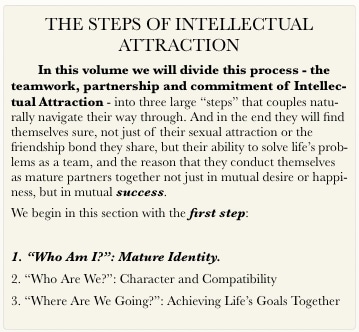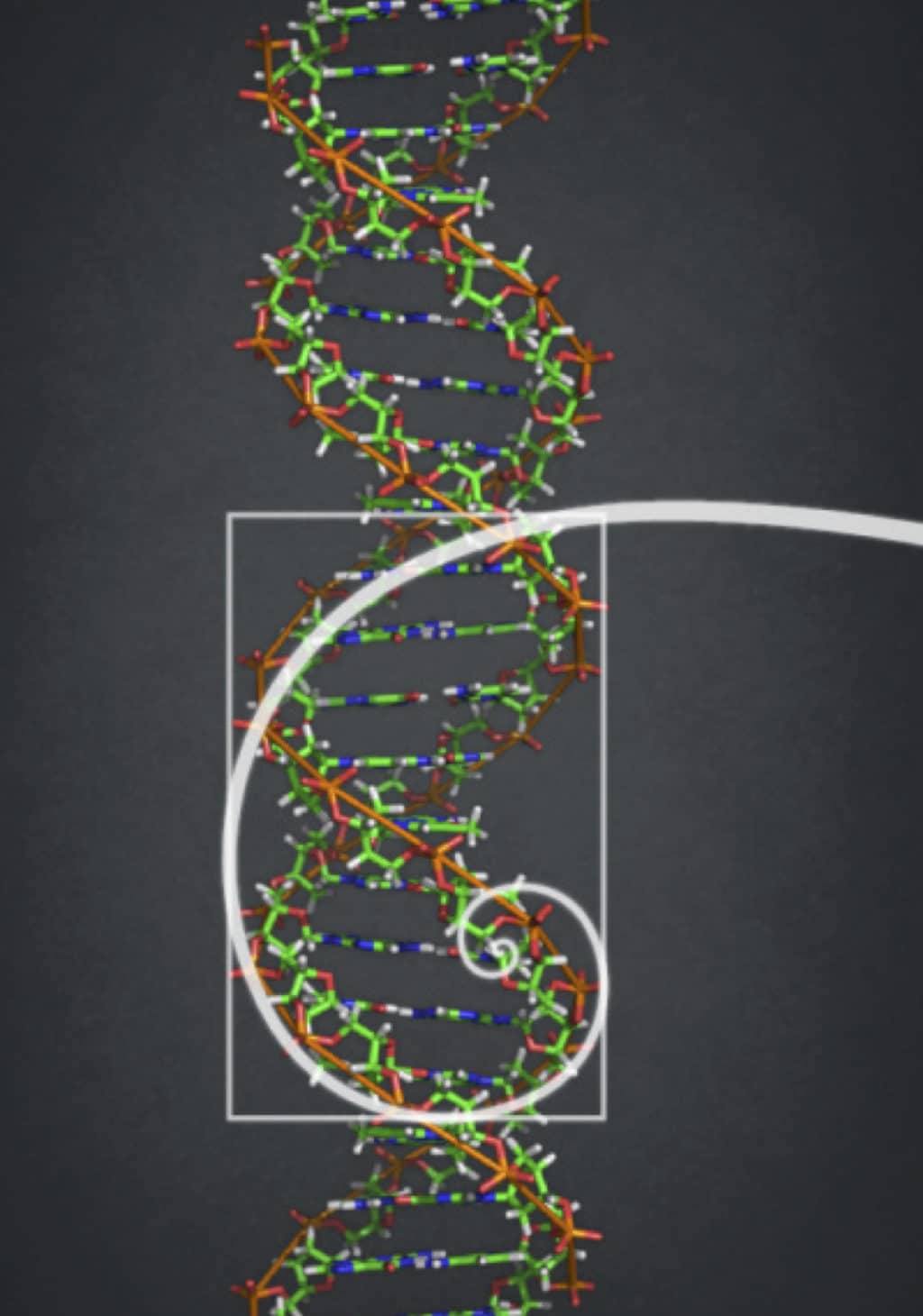The higher brain is the most conscious set of software in romance, and the intellectual attraction phase is most dependent on first, one's personal growth toward character maturity and virtue (Who I am), and then, on joining the best of one's virtues as a partner with complementary virtues that one may lack, constitutionally, or by way of having identified with the particular same-sex parent that one happened to be given as a newborn.
It is in this step that we need to survey and work on every aspect of our personal psychology of character maturity, to be sure that we are fit as valuable partners to another person in a romantic relationship. This one step of romance also offers us a "total makeover" in terms of the psychology of personal growth, and "success training."
We cover each, specific tool or skill of personal psychology here...
For example, we will learn of the core personal growth skill of Observing Ego, the Personal Boundary, the dynamics of the emotions in the Anger Map and Anxiety Map, as well as how to use conscience and intuition, or ethics and shrewdness in order to make wise decisions, finally joining them all together with our intellectual abilities with Education and Experience that are the source of success in our goals.
We will watch ourselves going from using more primitive and immature ego defenses as our social habits, to the neurotic ego defenses, and finally to the Mature Ego Defenses, which are essentially the same as Character Virtues.
Now we are fully ready to take on a partner, knowing that we have worked on our own virtues as successful partners while still in the single life. We are fully ready to be a partner, and to find one that we deserve.
Step 7 is a very, very large portion of your overall training and preparedness for full, lifelong romance with one person. Yet it is not new to you, the kind of advice your grandmother may have given you: "You have to know yourself to be with another person in love." It is the fullest sense of self you can reach, through personal growth efforts to become a mature, virtuous person. And so in itself, Step 7 is a sort of "personal growth course" covering many of the features of how your conscious mind works and matures over time.
You can learn much more about this step in the whole series of deep lessons on it, at the main site articles of "Who I Am."
To be prepared to be a great partner to someone else, and if you have limited time and attention, you need to at least work on two crucial tools or skills of psychology:
Observing Ego, or mindfulness, and Personal Boundary ability.
- Observing Ego is the ultimate personal growth skill, which is a bit like being your own personal growth coach, being self-aware and self-observant, as well as socially aware. It is the basis of why we call some people we meet, "Cool." A "cool person" is self aware and does the socially right things in the right way at the right time.
- Personal Boundary ability is the next universal personal growth task - perhaps the most important and closely aligned with being a mature, virtuous person - the workings of the Personal Boundary, with its "holes", "walls" and "doors," the most mature feature.
From there, we return to our emotions and how to get them more constructive and mature, more "win/win" in nature, which is the opposite of childishness and pathologic narcissism. We start to do more virtuous things with our emotions such as assertiveness and courage.

We learn of the importance of balance in our psychological resources, and how to use them, guiding them with the intellect that is the part and parcel of the Higher Brain itself, and we grow education and experience in our left-brain and right-brain, in balance.
We unify many of these ideas with some standard models from psychology. For example, one existing way that psychologists can actually "measure" one's maturity level is by way of the psychodynamics of the "Ego Defenses," also called "defense mechanisms." We can look at these to see four levels of maturity - Primitive Ego Defenses, Immature Ego Defenses, Neurotic Ego Defenses, and finally Mature Ego Defenses. And yet on closer inspection, the last category, the Mature Ego Defenses are one and the same as the Virtues discussed by ancient philosophers.
And so we will use the term, "virtues," or "virtuous" to mean both what the philosophers were talking about, and also what modern researchers are finding.
Having done our best to reach the highest maturity of character and virtue that we can, we have done all we can to be a fit partner toward achieving success with another person. Both in our personal life's goals, and those we will form as a couple.
THE EVENTS OF STEP SEVEN OF COURTSHIP:
The short list of the specific tools and working parts of psychology that we need to explore and master for our personal growth as a single person fit for success, are:
- Observing Ego - the ability to be mindful, attentive, self-directing and curious.
- The Personal Boundary - the ability to know what you control from what you don't, to shield yourself from stress and to not invade other people's space or resources, preserving your own and having diplomacy, virtue and maturity.
- Mastering the negative emotions of Anger and Anxiety with the Anger Map and Anxiety Map.
- Constructive thinking and behavior ("win/win" vs "win/lose") to counter Pathological Narcissism, to do what's difficult but right, over what is impatient, selfish, childish and wrong.
- Wisdom in the working parts of a decision: Conscience and Intuition to guide doing right by others with decisions, but in environments and people who are good and benificent back to you. Getting a higher return than you invest, for all.
- Intelligence to fill the intellectual left-brained and right-brained "tanks": Education and Experience, to use information highly effectively toward goals, and with efficiency.
- Intention: the success skill that uses all the above to navigate to our goals, and is the opposite of "suffering." Making certain of the likelihood of winning a goal before you invest too much.
This technology need not only be exclusive to romance, but to any kind of collaborative effort between two people, even if the environment is a difficult one.
The items in this material of this step alone constitute an entire personal growth program used for the purpose of character maturity, called "MindOS." Like it sounds, it is the "operating system of the human mind." As such, you can use the growth material here as a single person with no intentions at romance, or to prepare for a business partnership, or to propel you to success as a single person.
However, one of the major tenets of Romantic Dynamics is that the context of a romantic relationship offers us none other than the best possible environment for personal growth. Most of us learn the most about ourselves through this process, much like the music metaphor of a "Canon," or melody played repeatedly in countless variations, until it is fully explored. There is hope in this, and in breakups and divorce, that each person we are romantic with is a chance to learn about ourselves in this way, and to change and grow.
TIPS FOR PERSONAL GROWTH AND FITNESS AS A PARTNER:
Since the goal of the Intellectual Attraction Phase is the ability to be successful at our life's goals and to raise the chances of success for a partner, consider the grand saboteur of relationships - Pathologic Narcissism - where we go the selfish route to getting what we want without much work, or patience, or sacrifice, and consciously or unconsciously use other people to get there. The models of Romantic Dynamics show us that the imbalance, disharmony and discord caused by narcissism's destructiveness always comes back to harm us more than benefitting us. It is "Karma" in mathematical form.
A quick way to amplify the main skills and working parts of psychology in personal growth are:
- OBSERVING EGO as a tool can be accessed any time you get completely present minded. Imagine ignoring the future entirely for the next few minutes, and ignoring the past entirely for the next few minutes, use youe senses RIGHT NOW, and see what you observe of yourself and others.
- THE PERSONAL BOUNDARY - a quick guide to using this crucial part of psychology of maturity is to practice saying and tolerating the word, "NO," more often. The perfect "ratio" in your life, for the number of times you say "yes" versus "no" to people, is 80/20. Find that you feel stronger for doing so.
- THE NEGATIVE EMOTIONS - to master these, simply turn to the Anger Map and Anxiety Map and study them.
- CONSTRUCTIVE THINKING AND ACTIONS - to master this, quickly, consider every decision or major action you take to need to benefit both you and your partner or friend. The "win/win" concept from Gae Theory simplifies this. In this way you are avoiding narcissism and being constructive, by shedding selfishness and "survivalist" thinking.
- WISDOM OF DECISIONS - any decision you make is guided by two skills - conscience (or ethics) and intuition (or shrewdness.) When you use these both it's as simple as asking yourself two questions before a decision: "Am I doing right by others?" and "Am I in the right social environment for it to be kind back to me?" The answer of NO to either question means that you shouldn't make the decision in its current form, or in that place with those people.
- THE INTELLECT - any chance you get to learn some new facts, or have a new experience, you should say YES to, so long as you have cross checked it against conscience and intuition first. Meaning, the environment is right, and the education and experience are right for the go ahead to learn something new, which makes you more successful.
- INTENTION - the working parts of intention are the four we just covered - conscience, intuition, education and experience - which together assure that the investment of resources toward a goal are likely to meet with success at achieving it. This is the ultimate personal skill to have as a partner to another person. It practically guarantees success.
When we have reached the end of the friendship phase, or the Emotional Attraction Phase of courtship, where love and happiness have maximized our mutual self esteem, and we may have been lucky enough to find ourselves with a personality opposite. This step is about going inside, alone, to prepare our maturity level for full partnership with another person, by having the mature character necessary to go for life with a person in romance.


